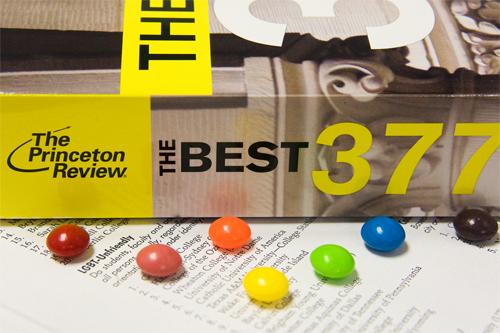
The Princeton Review released an annual report on the LGBT-friendliness of American universities and colleges. (Sidney Hollingsworth/The Daily Campus)
After making a four-time appearance on the top 20 spot, SMU has finally been removed from the Princeton Review of most “LGBT-unfriendly” schools. Yet, Texas leads with the greatest number of universities on the most homophobic list.
The Princeton Review annually surveys students from more than 300 colleges to compile “The Best 377 Colleges” guide.
The guide provides 62 lists ranking professors, dorms and popular majors. The 62 lists are compiled from one survey that students can fill out once every academic year. The survey is on the Princeton Review website.
“The survey has two rankings that yield specifically with with schools being either [LGBT]unfriendly or friendly. We are trying to give college bound students some perspective,” Robert Franek, senior vice president Publisher and author of “The Best 377 Colleges,” said.
“The survey stays open throughout the year with the ranking list coming out early to mid-May. The results come directly from student opinions.”
Texas universities compose almost one-fifth of the list. Texas A&M, Baylor University and University of Dallas have made the No. 7, No. 10, and No. 15 spots respectively. Last year, Baylor University did not make the list even though the school lacks a non-discriminatory policy.
This year, the Princeton Review survey question asked, “Do students, faculty and administrators treat all persons equally regardless of their sexual orientation and gender identity or expression?”
SMU has taken strides to better the campus atmosphere and educate students about the existence of homophobia. Some initiatives were the construction of gender-neutral bathrooms, partaking in the Pride Parade, and drafting legislation towards creating a LGBT Senator.
“There has been a distinctive change outside on campus. By pushing LGBT topics, that translated to the campus being more open to hearing LGBT issues. Having Baylor on the list, this year, provides more legitimacy to the survey,” Harvey Luna, co-president of Spectrum, a LGBT organization at SMU, said.
The legitimacy of the Princeton list was called into question by SMU administration in 2011 when SMU jumped up four spots to No. 12. SMU is part of only a handful of universities that has a LGBT-inclusive nondiscrimination policy and offers benefits to the same-sex partners of employees.
“We have tried to keep the language consistent with the 21st year printing the book,” Franek said.
“We are conscious to capture the gender identity and to remain as inclusive as possible. We want to cast the absolute widest net possible.”
Princeton Review works with school administrators on a rotating basis every three years.
Together they work on sending out a campus wide survey to get the most student input. The questions, on the online survey, tend to remain consistent from year to year.
“I am glad to not be considered one of the most homophobic schools. We[SMU] reflect the world we live in and so unfortunately homophobia is here too. We have to continue to educate and prepare our students to understand and confront that.” Karen Click, Director of the Women’s Center said. “What were not assessed were the resources of support, policies that affirm LGBT identity, and the great experiences many students have.”
Another tool called Campus Pride, a volunteer-driven group striving to make safer college environments for LGBT students, also offers its own index that rates colleges and universities.
Using a numerical ranking system, which scores schools from a scale of one to five, the survey encompasses LGBT student life, policy inclusion and academic life. SMU is currently rated a four on the index.
“Thinking of new ways to be visible in the community is what is going to change perceptions and help students understand the diversity on this campus,” Click said.








